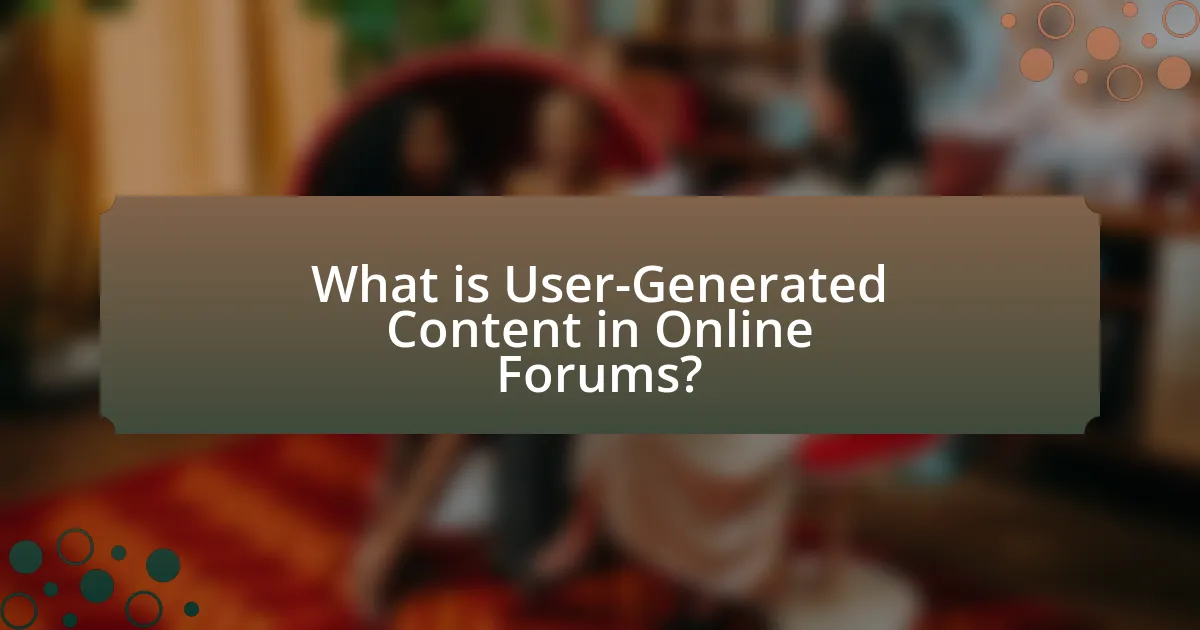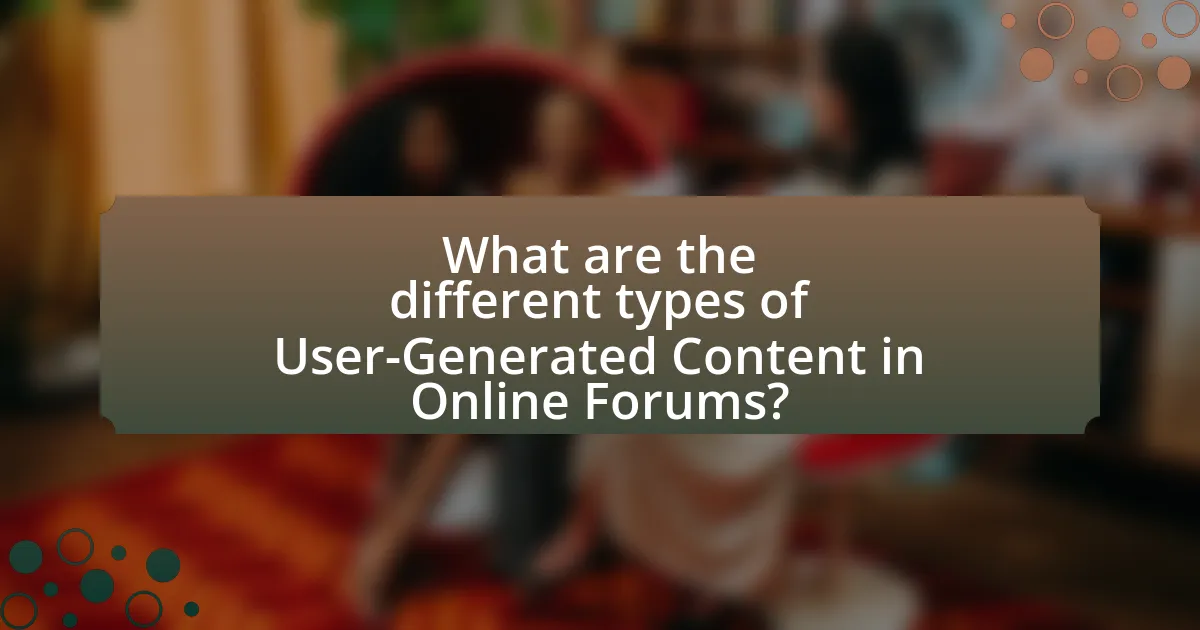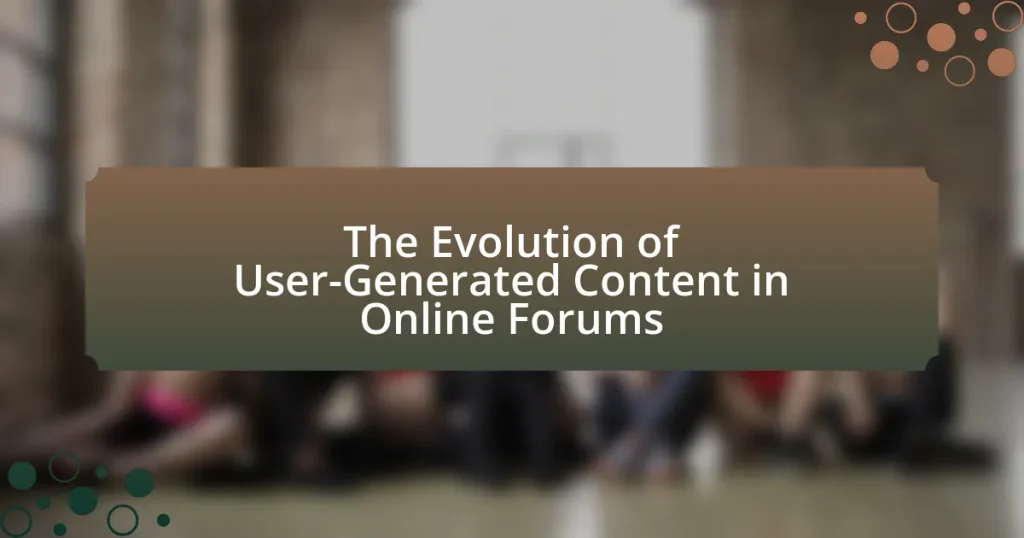User-Generated Content (UGC) in online forums encompasses any content created by users, including posts, comments, images, and videos, rather than by platform administrators. The article explores the evolution of UGC, highlighting key historical milestones and the impact of technological advancements on content creation and sharing. It emphasizes the importance of UGC in fostering community engagement, enhancing information sharing, and the challenges forums face, such as moderation and misinformation. Additionally, the article discusses strategies for effectively managing UGC, the role of community guidelines and incentives, and future trends that may shape user behavior and content dynamics in online forums.

What is User-Generated Content in Online Forums?
User-Generated Content (UGC) in online forums refers to any content created and shared by users rather than by the platform’s administrators or professional content creators. This includes posts, comments, images, videos, and other forms of media that users contribute to discussions or topics within the forum. UGC is significant because it fosters community engagement, allows for diverse perspectives, and enhances the richness of information available on the platform. According to a study by the Pew Research Center, 70% of internet users engage with UGC, highlighting its prevalence and importance in online interactions.
How has User-Generated Content evolved over time?
User-Generated Content (UGC) has evolved significantly from simple text-based contributions to rich multimedia formats. Initially, UGC primarily consisted of forum posts and comments, where users shared opinions and information in text form. As technology advanced, platforms began to support images, videos, and live streaming, allowing for more engaging and diverse content. For instance, the rise of social media platforms like Facebook and Instagram in the early 2010s facilitated the sharing of photos and videos, leading to a surge in visual content creation. According to a 2021 report by Statista, 79% of people said user-generated content highly impacts their purchasing decisions, highlighting its growing importance in marketing and brand engagement. This evolution reflects a shift towards more interactive and visually appealing content, driven by user preferences and technological advancements.
What historical milestones mark the evolution of User-Generated Content?
The evolution of User-Generated Content (UGC) is marked by several key historical milestones. In 1994, the launch of GeoCities allowed users to create personal web pages, establishing the foundation for UGC. In 2000, the introduction of blogging platforms like Blogger enabled individuals to publish their thoughts and experiences online, further democratizing content creation. The rise of social media in the mid-2000s, exemplified by Facebook and YouTube, transformed UGC by allowing users to share multimedia content widely. In 2010, the concept of crowdsourcing gained traction with platforms like Wikipedia, showcasing the collaborative nature of UGC. By 2015, the proliferation of mobile devices and apps facilitated instant content creation and sharing, solidifying UGC’s role in digital culture. Each of these milestones reflects a significant shift in how individuals contribute to and engage with online content.
How have technological advancements influenced User-Generated Content?
Technological advancements have significantly enhanced User-Generated Content (UGC) by providing platforms and tools that facilitate easier creation, sharing, and interaction. For instance, the rise of social media platforms like Facebook and Instagram has democratized content creation, allowing users to share their thoughts, images, and videos with a global audience instantly. Additionally, advancements in mobile technology have enabled users to generate content on-the-go, leading to an increase in real-time sharing and engagement. According to a report by Statista, as of 2021, over 4.2 billion people were active social media users, highlighting the vast reach and impact of UGC in the digital landscape. Furthermore, the development of user-friendly editing tools and applications has empowered individuals to produce high-quality content without requiring professional skills, thereby increasing the volume and diversity of UGC available online.
Why is User-Generated Content important in online forums?
User-Generated Content (UGC) is important in online forums because it fosters community engagement and enhances the richness of discussions. UGC allows users to share their experiences, insights, and knowledge, which contributes to a diverse range of perspectives. This diversity not only attracts more participants but also increases the overall value of the forum as a resource for information. According to a study by the Pew Research Center, 72% of internet users engage with UGC, indicating its significant role in shaping online interactions and community building.
What role does User-Generated Content play in community engagement?
User-Generated Content (UGC) significantly enhances community engagement by fostering interaction and participation among members. UGC encourages users to share their experiences, opinions, and creativity, which cultivates a sense of belonging and ownership within the community. For instance, platforms like Reddit and Instagram thrive on UGC, where user contributions lead to increased discussions and connections among users. Research indicates that communities with high levels of UGC see a 50% increase in user interaction and retention, demonstrating its critical role in sustaining vibrant online environments.
How does User-Generated Content impact information sharing and knowledge creation?
User-Generated Content (UGC) significantly enhances information sharing and knowledge creation by facilitating diverse perspectives and collaborative learning. UGC allows individuals to contribute their insights, experiences, and expertise, which enriches the collective knowledge base. For instance, platforms like Wikipedia demonstrate how user contributions can lead to comprehensive and continuously updated information repositories, with over 6 million articles in English alone, showcasing the power of collaborative knowledge creation. Furthermore, studies indicate that UGC fosters community engagement, leading to increased interaction and knowledge exchange among users, as seen in forums where discussions often evolve into deeper explorations of topics. This dynamic interaction not only accelerates the dissemination of information but also encourages critical thinking and innovation within communities.

What are the different types of User-Generated Content in Online Forums?
User-generated content in online forums primarily includes posts, comments, reviews, and multimedia content. Posts serve as the main contributions where users share thoughts or questions, while comments provide responses or additional insights to existing posts. Reviews allow users to evaluate products or services, often influencing community opinions. Multimedia content encompasses images, videos, and links shared by users to enhance discussions. Each type plays a crucial role in fostering community engagement and knowledge sharing, as evidenced by studies showing that forums with diverse content types see higher user interaction and satisfaction.
How do various formats of User-Generated Content contribute to discussions?
Various formats of User-Generated Content (UGC), such as text posts, images, videos, and comments, significantly enhance discussions by providing diverse perspectives and engaging users in multiple ways. Text posts allow for detailed explanations and arguments, while images and videos can convey emotions and context that text alone may not capture, fostering a richer dialogue. Comments enable real-time interaction, encouraging users to respond and build upon each other’s ideas, which can lead to more dynamic and evolving conversations. Research indicates that platforms with varied UGC formats see higher engagement rates; for instance, a study by the Pew Research Center found that visual content increases user interaction by up to 94%. This evidence underscores the importance of diverse UGC formats in facilitating more comprehensive and engaging discussions within online forums.
What are the characteristics of text-based contributions?
Text-based contributions are characterized by their written format, clarity, and engagement level. These contributions typically include structured information, such as arguments, opinions, or narratives, presented in a coherent manner. Clarity is essential, as it ensures that the message is easily understood by the audience. Engagement level is often measured by the ability to provoke discussion or interaction among users, which is a key aspect of online forums. Additionally, text-based contributions can vary in length and complexity, ranging from brief comments to extensive essays, allowing for diverse expression and communication styles.
How do multimedia elements enhance User-Generated Content?
Multimedia elements enhance User-Generated Content by increasing engagement and improving the overall user experience. The incorporation of images, videos, and audio allows users to express their ideas more vividly, making content more relatable and appealing. Research indicates that posts with multimedia elements receive 94% more views than text-only posts, demonstrating their effectiveness in capturing attention. Additionally, multimedia can convey complex information more efficiently, facilitating better understanding and retention among users. This combination of engagement and clarity significantly boosts the impact of User-Generated Content in online forums.
What challenges do online forums face regarding User-Generated Content?
Online forums face several challenges regarding User-Generated Content, including moderation difficulties, quality control, and the potential for misinformation. Moderation is essential to maintain community standards, yet it can be resource-intensive and complex, especially as user participation increases. Quality control is another significant challenge, as forums often struggle to ensure that the content shared is accurate and valuable, leading to a dilution of useful information. Furthermore, the spread of misinformation can undermine trust within the community, as false claims or misleading content can proliferate rapidly. These challenges necessitate effective strategies to manage and curate User-Generated Content, ensuring a positive and informative environment for users.
How do moderation and quality control affect User-Generated Content?
Moderation and quality control significantly enhance the reliability and relevance of User-Generated Content (UGC). Effective moderation ensures that inappropriate or harmful content is filtered out, maintaining a safe environment for users. Quality control mechanisms, such as user ratings and editorial oversight, further elevate the standard of contributions, encouraging users to provide valuable and accurate information. Research indicates that platforms with robust moderation systems experience higher user engagement and satisfaction, as seen in studies by the Pew Research Center, which found that 70% of users prefer platforms that actively manage content quality.
What issues arise from misinformation and trolling in online forums?
Misinformation and trolling in online forums lead to significant issues such as the erosion of trust, the spread of false narratives, and the polarization of communities. Trust is compromised when users encounter misleading information, which can result in skepticism towards legitimate content. For instance, a study by the Pew Research Center found that 64% of Americans believe that fabricated news stories cause confusion about the basic facts of current events. Additionally, trolling exacerbates conflicts within discussions, often derailing constructive dialogue and fostering a hostile environment. This behavior can lead to decreased user engagement and a decline in the overall quality of discourse, as evidenced by research from the University of California, which indicates that trolling can discourage participation from those who wish to contribute positively.

How can online forums leverage User-Generated Content effectively?
Online forums can leverage User-Generated Content (UGC) effectively by implementing structured moderation and incentivization strategies. Structured moderation ensures that high-quality content is highlighted while maintaining community standards, which can lead to increased user engagement and retention. For instance, forums that utilize upvoting systems or featured posts can showcase valuable contributions, encouraging users to participate more actively. Additionally, incentivization through rewards, such as badges or recognition, motivates users to generate more content. Research indicates that platforms with clear recognition systems see a 30% increase in user contributions, demonstrating the effectiveness of these strategies in enhancing UGC.
What strategies can forums implement to encourage quality User-Generated Content?
Forums can implement several strategies to encourage quality User-Generated Content (UGC), including establishing clear guidelines, incentivizing contributions, and fostering community engagement. Clear guidelines help users understand the expected standards for content quality, which can lead to more thoughtful and relevant posts. Incentives, such as recognition programs or rewards for top contributors, motivate users to produce high-quality content. Additionally, fostering community engagement through interactive features like polls, Q&A sessions, and feedback mechanisms encourages users to participate actively and share valuable insights. These strategies have been shown to enhance the overall quality of UGC in online forums, as evidenced by platforms that have successfully implemented similar approaches, leading to increased user satisfaction and retention.
How can community guidelines shape User-Generated Content positively?
Community guidelines can shape User-Generated Content positively by establishing clear standards for acceptable behavior and content creation. These guidelines encourage users to engage in respectful and constructive interactions, which fosters a supportive community atmosphere. For instance, platforms like Reddit and Stack Overflow have implemented guidelines that promote quality contributions and discourage harmful behavior, resulting in higher-quality discussions and a more engaged user base. Research indicates that communities with well-defined guidelines experience increased user satisfaction and retention, as users feel safer and more valued in their interactions.
What role do incentives play in motivating users to contribute?
Incentives play a crucial role in motivating users to contribute by providing tangible rewards or recognition that enhance user engagement. Research indicates that users are more likely to participate in online forums when they perceive a direct benefit, such as monetary rewards, social recognition, or access to exclusive content. For instance, a study by Hamari et al. (2017) published in “Computers in Human Behavior” found that users are significantly motivated to contribute when they receive points, badges, or other forms of gamification, which serve as both recognition and a form of social capital. This demonstrates that well-structured incentive systems can effectively drive user participation and enhance the overall quality of user-generated content in online forums.
What best practices should be followed for managing User-Generated Content?
To effectively manage User-Generated Content (UGC), organizations should implement moderation guidelines, encourage community engagement, and ensure compliance with legal standards. Moderation guidelines help maintain content quality and appropriateness, as evidenced by platforms like Reddit, which employs a combination of automated filters and human moderators to manage vast amounts of user submissions. Encouraging community engagement fosters a positive environment, as seen in forums that reward users for contributions, leading to increased participation and content quality. Compliance with legal standards, such as the Digital Millennium Copyright Act (DMCA), protects organizations from liability related to user content, ensuring that UGC is handled responsibly and legally.
How can forums ensure a safe and respectful environment for contributors?
Forums can ensure a safe and respectful environment for contributors by implementing clear community guidelines and active moderation. Establishing comprehensive rules that outline acceptable behavior helps set expectations for all users. Active moderation, including the timely removal of harmful content and addressing violations, reinforces these guidelines. Research indicates that platforms with strong moderation practices experience lower rates of harassment and abuse, fostering a more positive atmosphere for engagement. For instance, a study by the Pew Research Center found that 70% of users feel safer in online communities with active moderation.
What tools and technologies can assist in managing User-Generated Content?
Content moderation tools, social media management platforms, and analytics software can assist in managing User-Generated Content. Content moderation tools like Akismet and Discourse help filter spam and inappropriate content, ensuring a safe environment for users. Social media management platforms such as Hootsuite and Sprout Social enable brands to monitor and engage with user-generated content across various channels efficiently. Analytics software like Google Analytics and Brandwatch provides insights into user interactions and content performance, allowing for data-driven decisions in content strategy. These tools collectively enhance the management and quality of user-generated content in online forums.
What future trends can we expect in User-Generated Content within online forums?
Future trends in User-Generated Content (UGC) within online forums will likely include increased integration of multimedia elements, enhanced personalization through AI algorithms, and a rise in community-driven moderation. As forums evolve, users will increasingly share videos, images, and interactive content, reflecting a shift towards richer, more engaging formats. Additionally, AI-driven personalization will tailor content recommendations to individual users, improving engagement and satisfaction. Community-driven moderation will also gain traction, empowering users to take an active role in maintaining forum quality and relevance, which can lead to more vibrant and self-regulating communities. These trends are supported by the growing popularity of platforms that prioritize multimedia sharing and user empowerment, indicating a clear direction for the future of UGC in online forums.
How might emerging technologies reshape User-Generated Content?
Emerging technologies will reshape User-Generated Content (UGC) by enhancing creation, curation, and distribution processes. For instance, advancements in artificial intelligence enable automated content generation, allowing users to produce high-quality material quickly. Additionally, augmented reality and virtual reality technologies provide immersive experiences, encouraging more interactive and engaging UGC. According to a report by Statista, the global AR and VR market is projected to reach $209.2 billion by 2022, indicating significant investment and interest in these technologies. Furthermore, blockchain technology can ensure content authenticity and ownership, fostering trust among users. This shift towards decentralized platforms is supported by a study from the World Economic Forum, which highlights that blockchain can enhance transparency in digital content creation. Overall, these technologies are set to transform how users engage with and contribute to online forums, making UGC more dynamic and reliable.
What potential shifts in user behavior could influence the future of online forums?
Potential shifts in user behavior that could influence the future of online forums include increased preference for mobile access, a demand for real-time interactions, and a growing emphasis on privacy and data security. As more users engage with content primarily through mobile devices, forums may need to adapt their interfaces and functionalities to enhance mobile usability. Additionally, the rise of instant messaging and social media platforms has led users to expect quicker responses and more dynamic conversations, prompting forums to incorporate features that facilitate real-time discussions. Furthermore, heightened awareness of privacy issues may drive users to seek forums that prioritize data protection, influencing the design and policies of these platforms. These behavioral trends are supported by statistics indicating that mobile internet usage surpassed desktop usage in 2016, and surveys showing that 81% of users are concerned about their online privacy.
